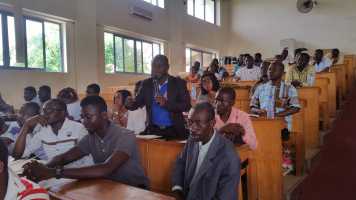Scientific Engagement at the University for Development Studies (UDS), Ghana.
The CDD-Ghana held a scientific engagement for senior undergraduate and graduate students, academics and researchers at the Wa campus of the University of Development Studies (UDS) in Wa in the Upper West region on Monday, March 21st 2016. The event, with a large audience of students and guests, was hosted by the department of Political, Social and Historical Studies of the UDS.

The conference was organized in two sessions and chaired by Dr. Frank Ten-Zeng, Deputy Dean, Faculty of Integrated Development Studies of the University.
The first session featured a presentation by Dr. Franklin Oduro of CDD-Ghana and Principal Investigator of the Ghana Study of the ‘Ethnic Power Relations and Conflict in Fragile States’ project. Dr. Oduro spoke of the theoretical underpinnings of the R4D Ethnic Power Relations Project. He then outlined the research activities of the various hubs as part of this and ran the audience through the process of accessing and visualizing GROWup data on ethnic power relations. In addition, Dr. Oduro also highlighted potential pathways to leveraging existing GROWup data for current research projects. During the second session, Paul Osei Kuffour, Nana Kwabena Aboramph and Nene-Lomo Kuditchar, all members of the R4D Ghana research team, spoke about the theoretical interests of the CDD-Ghana and its research activities.
Each presentation was followed by plenary discussions from participants. These included, among others, questions from the audience about the research project, the dataset and how to access it. In addition, the CDD-Ghana distributed fact sheets on the R4D project and copies of the research project’s policy brief entitled ‘Ethnic Power Relations and Conflict: Lessons from around the World’, authored by Dr. Manuel Vogt. The CDD-Ghana team also had discussions with the UDS faculty on how to formalize collaborative research efforts based on the EPR project.
For more information, please refer to the Downloadofficial flyer (PDF, 189 KB)vertical_align_bottom for the event.
